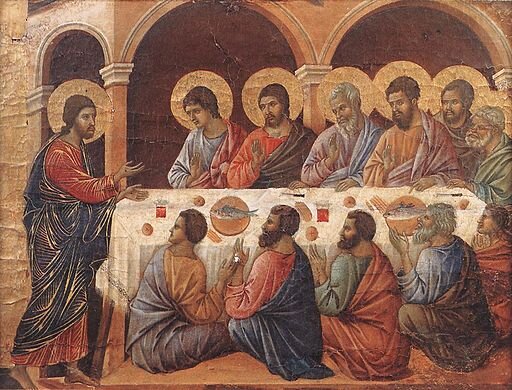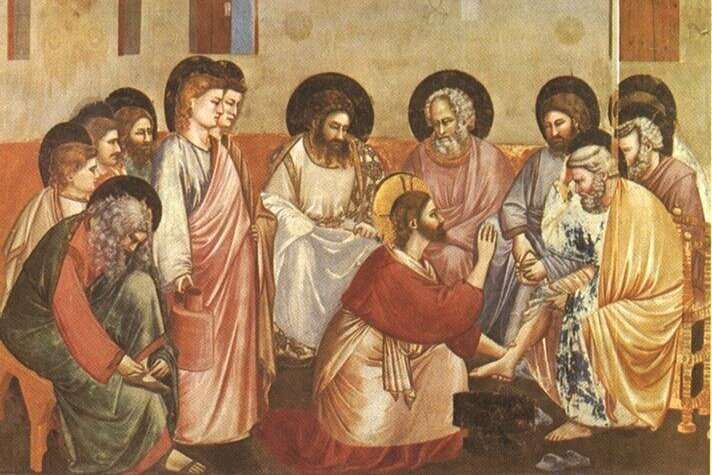by Rev. Bill Garrison
Mark 5:21-43
When Jesus had crossed again in the boat to the other side, a great crowd gathered around him; and he was by the sea. Then one of the leaders of the synagogue named Jairus came and, when he saw him, fell at his feet and begged him repeatedly, “My little daughter is at the point of death. Come and lay your hands on her, so that she may be made well, and live.” So he went with him.
And a large crowd followed him and pressed in on him. Now there was a woman who had been suffering from hemorrhages for twelve years. She had endured much under many physicians, and had spent all that she had; and she was no better, but rather grew worse. She had heard about Jesus, and came up behind him in the crowd and touched his cloak, for she said, “If I but touch his clothes, I will be made well.” Immediately her hemorrhage stopped; and she felt in her body that she was healed of her disease. Immediately aware that power had gone forth from him, Jesus turned about in the crowd and said, “Who touched my clothes?” And his disciples said to him, “You see the crowd pressing in on you; how can you say, ‘Who touched me?’” He looked all around to see who had done it. But the woman, knowing what had happened to her, came in fear and trembling, fell down before him, and told him the whole truth. He said to her, “Daughter, your faith has made you well; go in peace, and be healed of your disease.”
While he was still speaking, some people came from the leader’s house to say, “Your daughter is dead. Why trouble the teacher any further?” But overhearing what they said, Jesus said to the leader of the synagogue, “Do not fear, only believe.” He allowed no one to follow him except Peter, James, and John, the brother of James. When they came to the house of the leader of the synagogue, he saw a commotion, people weeping and wailing loudly. When he had entered, he said to them, “Why do you make a commotion and weep? The child is not dead but sleeping.” And they laughed at him. Then he put them all outside, and took the child’s father and mother and those who were with him, and went in where the child was. He took her by the hand and said to her, “Talitha cum,” which means, “Little girl, get up!” And immediately the girl got up and began to walk about (she was twelve years of age). At this they were overcome with amazement. He strictly ordered them that no one should know this, and told them to give her something to eat.
It’s always useful to know who is in charge isn’t it? Usually, it’s not difficult to figure out in almost any situation. Today we are going to talk about the difference the person in charge makes in almost any situation. Here’s an example.
The sales chief, the HR chief, and the boss were on their way to lunch around the corner. They detoured through an alley and stumbled on a beat up but valuable looking brass container. The sales chief picked it up and started cleaning it with his handkerchief. Suddenly, a genie emerged out of a curtain of purple smoke. The genie was grateful to be set free, and offered them each a wish.
The HR chief was wide-eyed and ecstatic. She said, “I want to be living on a beautiful beach in Jamaica with a sailboat and enough money to make me happy for the rest of my life.” Poof! She disappeared,
The sales chief said, “Wow! I want to be happily married to a wealthy supermodel with penthouses in New York, Paris, and Hong Kong.” Presto, he vanished.
“And how about you?" asked the Genie, looking at the boss.
The boss scowled and said, "I want both those idiots back in the office by 2 PM."
MORAL: Always let your boss speak first.
I have found that to be true. How about you?
But seriously, for a moment let’s think about bosses. A great boss can make a world of difference in a workplace, just as a poor boss can make the workplace a tough place to be. Rather than thinking about the poor boss let’s concentrate on the great one.
When we have a great boss, people are comfortable and happy. Production is high. People are empowered and don’t have to run to the boss every five minutes to get permission to do things. Money, always important, is not the primary interest. A feeling of creativity and accomplishment is. If you have ever had a great boss, you know exactly what I am talking about. You can’t wait to make her happy and be in her presence.
Today’s gospel is talking about the best boss ever, our God. Let’s look at the two stories within the scripture.
Jairus was in jeopardy of losing his twelve-year-old daughter. She was gravely ill. He had run out of options even though he was an important person. As a last resort he begged Jesus repeatedly to come and lay his hands on her, believing that by Jesus doing so she would be saved from death. Can you imagine his desperation to have finally approached a person generally regarded as trouble by the elite?
Jesus went with him.
Before they got to Jairus’ house news came that the little girl had died. I’m sure Jairus felt like his own life had ended. The torment he immediately felt would have been the most painful of his life, I am sure. It must have been excruciating. But Jesus turned to him. “Do not fear, only believe.” Hang on man, it’s going to be ok. I promise.
When they got to Jairus’ house the folks there laughed at Jesus when he told them the little girl was not dead but only sleeping. They knew better and they thought Jesus was a fool.
He threw them out and took in the three disciples with him, and the little girl’s mother and father, to see her. “Talitha cum”. “Little girl, get up.” And she did!
Put yourselves in her parent’s shoes. Imagine the disbelief and the joy. I’m sure the tears were flowing and their hearts were bursting with gratitude as they held her. Their daughter was alive when they thought she had been lost.
Now as we remember the gospel read a few minutes ago we recall that Jesus was stopped on the way by a woman who had been hemorrhaging for twelve years. Can you imagine? In that day she would have been an outcast in society for all that time. Her loneliness must have been bone marrow deep. Many doctors had tried to cure her, and in the process of seeking help she had spent all that she had. She was very ill, an outcast, and broke. On top of all that the bleeding had gotten even worse.
She had heard about Jesus but never met him. She thought that maybe if she just touched the hem of his cloak, she might be healed. That’s how desperate she had become. She was willing to try anything.
She came up behind Jesus and did just that. She touched his cloak and knew immediately she had been healed. Twelve years of suffering were over. Can you imagine her relief and joy?
Jesus felt the healing happen and turned to find out who had touched him in that way. And she told him the truth, what she had done, even though she was worried about what his reaction might be.
What she heard from Jesus was not what she expected. “Daughter, your faith has made you well; go in peace, and be healed of your disease.” I am sure she stood there in joy, and wonder, as he turned from her and continued on his way, the crowd surrounding and following him, watching the spectacle as it moved on without her.
Now let me tell you what these stories are not about. They are not about a concept of faith that insists we must have enough faith or what we want won’t happen. Folks we are not in charge. We are not going to be in charge. It’s not about how much faith we can muster. It’s a completely different understanding of what faith is.
And these stories are not about doing things exactly right. We would like to think that touching the hem of Jesus’ garment is what led to her healing. It’s like the priest that thinks he or she must pray the eucharistic prayer perfectly, with perfect intonation and hand gestures for the bread and wine to be transformed. Neither idea is true. If it was Jesus would not have turned back. He would have continued to move on. We so want to be in charge. Nope. The boss is in charge.
What the stories are telling us is that when we put ourselves in the presence of God the world is different and great things can happen. Jairus and the woman put themselves in God’s presence. They did not have the power to heal nor did they think that they did. Their faith was of a different kind. Their faith was in God, the boss’s presence. Just being in the presence of God, the Kingdom of God if you will, is where life can happen.
This is the not-so-secret sauce. First, we admit God is the boss and we are not. No matter how holy we become or how hard we work at faith, it will never get the job done. Second, we seek the presence of God, just as Jairus and the woman did. It is within this presence that all things are possible. And remember this. Our boss is the ultimate entrepreneur. God created the universe and everything within it. If it be God’s will then it is. But God gets to be God. What God plans is better than we can imagine, even though at the time we may be disappointed because we didn’t get what we were seeking. Trust the boss. God knows best. God has a better idea. Hang on. As Jesus said in the gospel, “Do not fear. Only believe.”




















